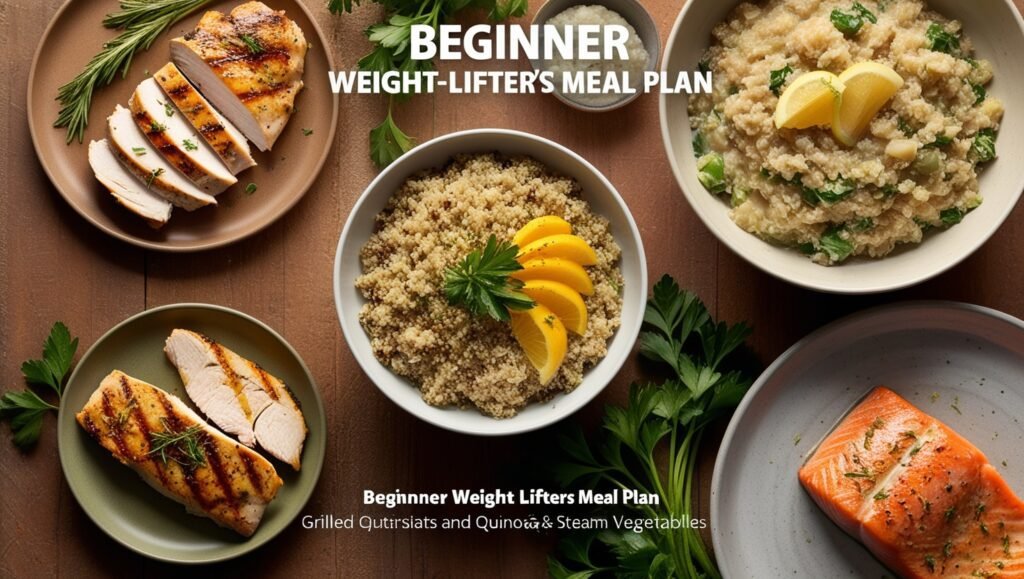Introduction
Weight lifting is one of the most effective ways to build muscle, enhance strength, and improve overall fitness. For beginners, stepping into the world of weightlifting can be intimidating. However, with the right knowledge, tools, and a structured routine, it becomes an enjoyable and rewarding experience. This article will break down everything you need to know about starting a beginner weight lifting routine, including essential tips, benefits, and a structured workout plan that you can follow.
Table of Contents
Beginner Weight Lifting Routine
Why Weight Lifting?
Weight lifting offers numerous benefits, including:
- Muscle Growth: Lifting weights causes small tears in muscle fibers, which repair and grow stronger.
- Improved Strength: Regular lifting increases muscle strength, making daily activities easier.
- Boosted Metabolism: More muscle means a higher resting metabolic rate, helping with fat loss.
- Better Bone Health: Weight-bearing exercises increase bone density, reducing the risk of fractures and osteoporosis.
- Enhanced Mental Health: Weight lifting boosts endorphins, reducing stress and improving mood.
Getting Started with Weight Lifting: Essential Tips
Before jumping into the gym, it’s important to understand some key principles that will guide your weight lifting journey:
- Focus on Form, Not Weight: Prioritize learning the correct technique for each lift over trying to lift heavier weights. Proper form minimizes the risk of injury.
- Start Slow: As a beginner, your muscles are not used to lifting weights. Start with lighter weights and gradually increase as you become stronger.
- Warm-Up and Cool Down: Always begin with a warm-up to prepare your muscles and joints, and finish with a cool-down to reduce soreness.
- Rest and Recovery: Your muscles need time to repair and grow. Ensure you get adequate rest between workout days.
- Stay Consistent: Like any fitness routine, consistency is key. Set realistic goals and stick to a regular schedule.
Beginner Weight Lifting Routine: The 3-Day Full-Body Workout
For beginners, a three-day full-body workout is a great way to introduce weight lifting into your routine without overwhelming your muscles. This plan focuses on compound movements that work multiple muscle groups, ensuring balanced development.
Day 1: Push Day (Chest, Shoulders, Triceps)

| Exercise | Sets | Reps |
|---|---|---|
| Bench Press (Dumbbell or Barbell) | 3 | 8-10 |
| Overhead Shoulder Press | 3 | 8-10 |
| Triceps Pushdowns | 3 | 10-12 |
| Push-Ups | 3 | Max Reps |
| Dumbbell Lateral Raises | 3 | 12-15 |
Day 2: Pull Day (Back, Biceps, Core)
| Exercise | Sets | Reps |
|---|---|---|
| Deadlifts | 3 | 6-8 |
| Bent-Over Rows | 3 | 8-10 |
| Lat Pulldown | 3 | 8-10 |
| Barbell Curls | 3 | 10-12 |
| Plank (for core) | 3 | 30-45 seconds |
Day 3: Leg Day (Quads, Hamstrings, Glutes, Calves)
| Exercise | Sets | Reps |
|---|---|---|
| Squats (Dumbbell or Barbell) | 3 | 8-10 |
| Lunges (Bodyweight or Dumbbell) | 3 | 8-10 per leg |
| Leg Press | 3 | 8-10 |
| Romanian Deadlift | 3 | 10-12 |
| Calf Raises | 3 | 15-20 |

This simple three-day plan covers all major muscle groups, ensuring you build a strong foundation for future progression. Each workout should last around 45-60 minutes.
Common Mistakes to Avoid in Beginner Weight Lifting Routine
- Skipping Warm-Ups: Warming up is crucial to prepare your muscles and prevent injuries.
- Not Using Full Range of Motion: Shortening the movement limits muscle activation and can lead to imbalances.
- Overloading Too Early: Increase weights progressively. Lifting too heavy too soon can lead to injury.
- Neglecting Nutrition: Weight lifting requires proper nutrition, especially protein, to support muscle growth.
- Ignoring Rest Days: Overworking your muscles without rest leads to fatigue and potential injury. Rest is when muscle growth happens.

The Importance of Nutrition for Weight Lifters
Nutrition plays a vital role in your weight lifting journey. Here’s a basic guide for beginners:
- Protein: Muscle repair and growth require adequate protein intake. Aim for 1.6-2.2g of protein per kg of body weight daily.
- Carbohydrates: Carbs provide energy for your workouts. Include complex carbs like brown rice, oats, and sweet potatoes.
- Fats: Healthy fats, like those from nuts, avocados, and olive oil, support hormone function and energy.
- Hydration: Stay hydrated by drinking plenty of water throughout the day, especially before and after workouts.
Sample Meal Plan for Beginners
| Meal | Foods | Calories |
|---|---|---|
| Breakfast | Oatmeal with Almond Butter, Scrambled Eggs | 500 |
| Lunch | Grilled Chicken, Quinoa, Steamed Vegetables | 600 |
| Snack | Greek Yogurt with Berries and Honey | 200 |
| Dinner | Baked Salmon, Brown Rice, Spinach | 700 |
| Post-Workout | Protein Shake (Whey Protein, Banana, Almond Milk) | 300 |
Beginner Weight Lifting Routine: Tracking Your Progress
It’s essential to track your progress to stay motivated and ensure you’re making gains. Here are some methods:
- Workout Log: Record the exercises, sets, reps, and weights you use each session. Aim to increase weights or reps over time.
- Body Measurements: Measure your chest, arms, waist, and legs every four weeks to track physical changes.
- Progress Photos: Taking before and after photos helps visualize changes that may not show up on the scale.
Beginner Progress Tracking Template
| Week | Bench Press (Weight) | Squats (Weight) | Deadlifts (Weight) | Comments |
|---|---|---|---|---|
| 1 | 20 kg | 30 kg | 40 kg | Focused on form |
| 4 | 25 kg | 35 kg | 45 kg | Increased strength |
| 8 | 30 kg | 40 kg | 50 kg | Significant progress |
Benefits of Beginner Weight Lifting Routine
- Fat Loss: Muscle mass burns more calories at rest, aiding in fat loss.
- Improved Cardiovascular Health: Weight lifting improves heart health by reducing blood pressure and cholesterol levels.
- Increased Strength: Everyday tasks become easier as you get stronger.
- Better Posture: Strengthening core and back muscles helps improve posture.
- Boosted Confidence: Seeing physical improvements boosts self-esteem and confidence.
Statistics on Weight Lifting Benefits
- A study from the American Council on Exercise (ACE) shows that weight training can increase resting metabolic rate by 7%.
- According to a report from Harvard Health, weight lifting lowers heart disease risk by 40% when done regularly.
Conclusion
Starting a beginner weight lifting routine is an excellent step toward improving your fitness, strength, and overall health. By focusing on proper form, staying consistent, and ensuring adequate nutrition, you can build a strong foundation for long-term success in the gym. Remember to track your progress, avoid common mistakes, and adjust your routine as you grow stronger.
Weight lifting is not just about physical transformation but also mental resilience and confidence building. With the information provided here, you now have everything you need to start your weight lifting journey with confidence!
References
- American Council on Exercise (ACE). “Resistance Training for Beginners.”
- Harvard Health Publishing. “Strength Training: Get Stronger, Leaner, and Healthier.”
- Journal of Strength and Conditioning Research. “Effect of Resistance Training on Resting Metabolic Rate.”




